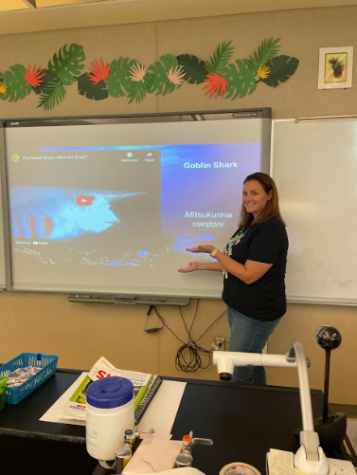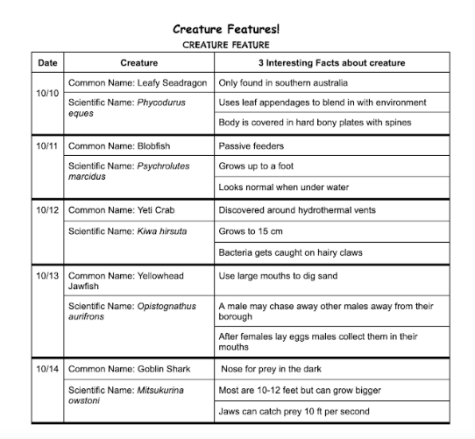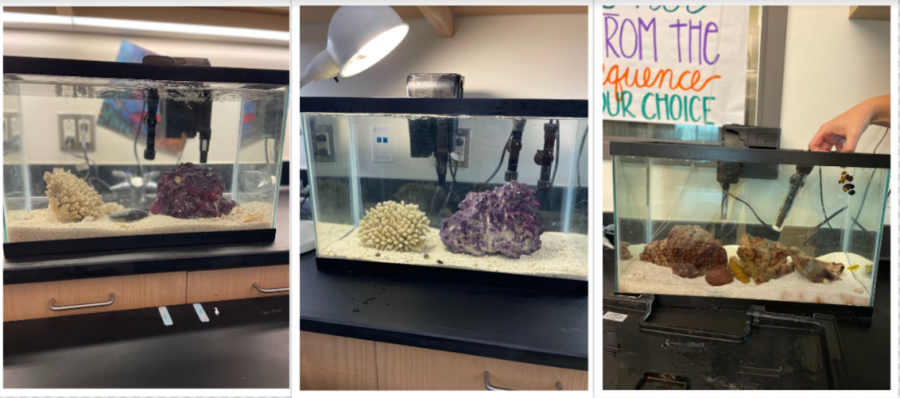Marine Science Features Why 71 Percent of Earth Matters
Three of the various student run tanks that are to be cared for weekly. One (to the right), holds class pet ‘Emo Nemo’ who at the time is being fed.
Marine Science, well-known as Marine Biology, is the study of oceans and marine life and has found its place in schools across the globe. The Marine Science program at Sage Creek was founded by teacher Courtney Goode and has been a beloved class since 2019. After many setbacks in starting the class, Goode was eventually able to convince the district of its importance, and, as of this year, teaches it for two to four periods per trimester (the others reserved for biology). The class uses branches of science like biology, geology and chemistry to prepare students to critically analyze contemporary issues such as environmental change, human impacts on the ocean and biodiversity.
Goode shares her original motivations and past experiences that inspired her to pursue this subject.

(Photo By Holden Kopman )
“With such limited science courses, once students had already taken biology and chemistry, we thought this would be a good fill-in as physics may seem ‘scary’ for many students,” Goode said. “When I was in 5th grade, my teachers would always bring in sea creature specimens in jars, and I thought it was the coolest thing, so I always wanted to grow up and be a marine biologist.”
As oceans hold such a massive impact on our world’s atmosphere and ecosystems, many like Goode believe if they are not properly protected from mankind’s issues, our environments may fall to shambles.
Climate change continues to be a lasting issue that has majorly affected the world’s oceans. As ocean acidification is considered one of the largest effects of climate change and has destroyed millions of marine habitats, it can only amplify how important Marine Science is and how students may learn to fix these world-threatening issues.
“The more I learn about the ocean, the more I figure out ways us humans are screwing it up,” Goode said. “This makes me more passionate and more ambitious to get the message out there to help people understand and fall in love with the ocean as much as I do, so they’ll save it one day.”
In the first trimester and over the course of nine weeks, students are tasked to take care of a saltwater fish tank which is constantly tested for ammonia, nitrites, nitrates and pH. Once test results are in the necessary range, students may first request “cleanup crew” creatures like hermit crabs and snails, then soon after, fish. The task of looking after a tank does not only serve as a purpose to test later on how the student’s tank has progressed, but to also measure students’ responsibility.
Junior Xavier Tolman shares his interests and connections made when in the class.

(Screenshot by Holden Kopman)
“Marine science is really interesting; I think Ms Goode does a great job everyday and I enjoy the class overall,” Tolman said. “I believe it will help me get a better understanding of our oceans and all marine life. I’d say the most enjoyable thing to learn so far was the unit about ocean sediments as my dad is a geologist.”
Marine Science allows its students to get a wider perspective of the ocean’s importance that many may have not known previously. Kelp and coral dying to ocean acidification, numerous marine species endangered from overfishing, millions of other species affected by growing pollution levels: these issues only touch the surface on how humans have negatively impacted the oceans. As it is believed that saving earth’s oceans is the key to survival, there is no doubt that Marine Science is a necessity.
“We have a lot of fun and do dissections. I hope I can make it challenging since we do every science that applies to the oceans; so I strive for students to learn a lot but have fun while doing it,” Goode says. “Take Marine Science!”


